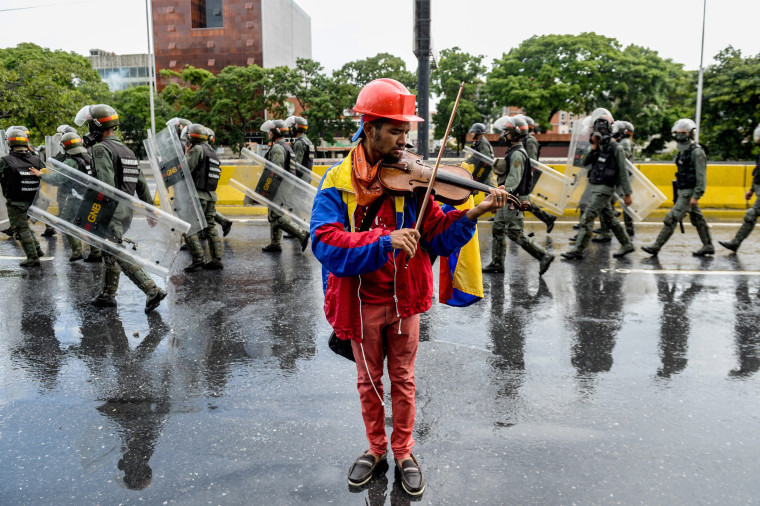CARACAS, Venezuela — A violinist who has become one of the best-known faces of protests against President Nicolas Maduro was injured on Saturday in violent clashes in the capital.
The Democratic Unity coalition had called a march on the pro-Maduro Supreme Court in support of alternative magistrates appointed by the opposition on Friday. But security forces blocked their way with armored cars and riot shields.

Clashes ensued for several hours as hundreds of masked youths hurled stones and Molotov cocktails at National Guard troops firing tear gas from motorbikes.
Several people were injured, including musician Wuilly Arteaga. The 23-year-old has become famous in Venezuela for playing the national anthem and other tunes on his violin in front of security lines as battles rage around him.
Paramedics attended Arteaga in the street as blood poured down his face. He later tweeted a video from hospital with a bandaged face and clutching his violin.
"Neither rubber bullets, nor pellets will stop our fight for Venezuela's independence," said Arteaga.
"Tomorrow I will be back in the streets."
The opposition coalition and a self-styled youth-led "Resistance" movement launched protests in early April against Maduro whom they accuse of turning Venezuela into a dictatorship and wrecking what should be a prosperous economy.
Related: Senior Venezuela Diplomat at U.N. Breaks with Maduro
Maduro calls demonstrators "terrorists" who are seeking a coup.
Since April, some 100 people have died in the unrest, including five during a national strike on Thursday.
Venezuela's political crisis has entered a dangerous new stage as the opposition escalates street tactics to try and block a controversial new super-congress Maduro wants to set up via an election next weekend.
The opposition is boycotting that vote which it says is a sham intended to guarantee a majority for the unpopular Maduro. Critics are instead demanding conventional elections to try and end nearly two decades of Socialist Party rule.
Foes of Maduro are threatening to shut down Venezuela with protests to block the July 30 vote for the Constituent Assembly, which could re-write the constitution and disband the existing opposition-led legislature.
Related: Opposition Stages National Work, Business Strike in Venezuela
Foreign pressure has grown too on Maduro to abort the vote, including a threat from President Donald Trump to apply economic sanctions.
But the government is showing no sign of backing down, announcing that it will put 232,000 soldiers on the streets to ensure the Constituent Assembly goes ahead in a week's time.
"Repression is the only way this regime keeps itself in power," opposition lawmaker Luis Florido said at Saturday's march.